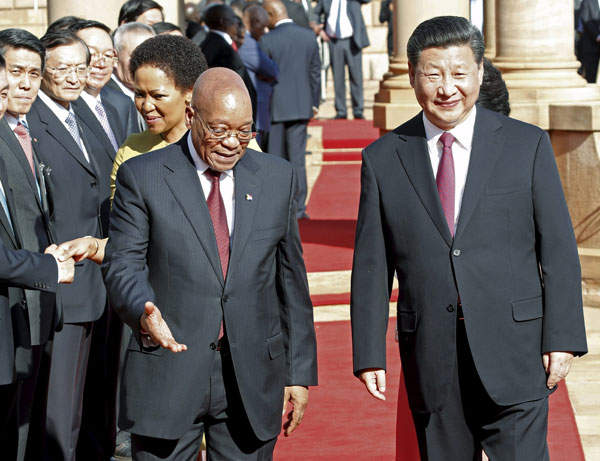

 |
| Chinese President Xi Jinping walks with South African President Jacob Zuma upon his arrival at the Union Buildings in Pretoria, December 2, 2015.[Photo/Agencies] |
President Xi Jinping's visit to Africa isn't just symbolic but also a reaffirmation of China's engagement with the continent. An engagement which gives impetus to the Chinese dream to actively and positively raise China's international influence through cooperation, partnerships and friendly bilateral relations.
China's astronomical development remains a model for all developing countries and as such its partnerships with African nations in a continent harbouring almost two thirds of the world's developing economies could only be welcomed.
Since the partition of Africa at the Berlin Conference of 1884 and the subsequent decolonisation of the continent in the 1960s, the economies of countries in Africa have suffered from a lame response to the continent's economic resurgence by the West, to put it bluntly, a dictatorial strings-attached aid form of development by the Bretton Woods institutions.
Despite the fact that many African countries for the past five to six decades have received substantial foreign direct investment from the West, Asian countries and other development partners, the continent remains the least industrialised in the world. So it is only prudent that countries in Africa warmly welcome increasing engagement from its largest trading partner with more than $220 billion in 2014.
The relationship between China and the region as observed by most analysts is more often mediated by formal government-to-government agreements leaving the private sector less involved. Countries with the most Chinese private investors are often government preferred destinations leaving many nations in sub-Saharan Africa with the exception of a few including South Africa, Zambia, Nigeria and Kenya less involved in Chinese engagement in the region.
Far more criticised is China's increasing investment in the extractive industries in Africa. To this, most African countries maintain that China's involvement has been positive and contributed to the rise of some of the fastest developing countries in the world, a feat they couldn't have achieved without the highly promoted new partnership agreements with China.
There are also several complications and impediments in Africa's engagement with China, where Africa's exports and investments remains limited in scale and scope. The solution, as opined by many analysts, that for Africa to replicate the East Asian economic miracle, African governments must adopt policies that enhance the international competitiveness of local industries, foster better governance, improve financial and labour markets, and attract more investment in infrastructure. Thus, African policymakers must make better use of China's involvement in the region as a lever for growth.
 |
 All-star Carnival held in Beijing
All-star Carnival held in Beijing Charming female bodybuilders of Chengdu University
Charming female bodybuilders of Chengdu University Polish sports stars strip off for risqué calendar
Polish sports stars strip off for risqué calendar Spectacular aerial photos of the Three Gorges
Spectacular aerial photos of the Three Gorges Contestants of Mrs. Globe pose for photo in Shenzhen
Contestants of Mrs. Globe pose for photo in Shenzhen
 Bikini models attend hot pot banquet in Hefei
Bikini models attend hot pot banquet in Hefei J-10B fighters with homegrown engine in test fligh
J-10B fighters with homegrown engine in test fligh Photos of U.S. Navy intruding in South China Sea released
Photos of U.S. Navy intruding in South China Sea released Cats who immediately regretted their life choices in photographs
Cats who immediately regretted their life choices in photographs Top 20 hottest women in the world in 2014
Top 20 hottest women in the world in 2014 Top 10 hardest languages to learn
Top 10 hardest languages to learn 10 Chinese female stars with most beautiful faces
10 Chinese female stars with most beautiful faces China’s Top 10 Unique Bridges, Highways and Roads
China’s Top 10 Unique Bridges, Highways and RoadsDay|Week